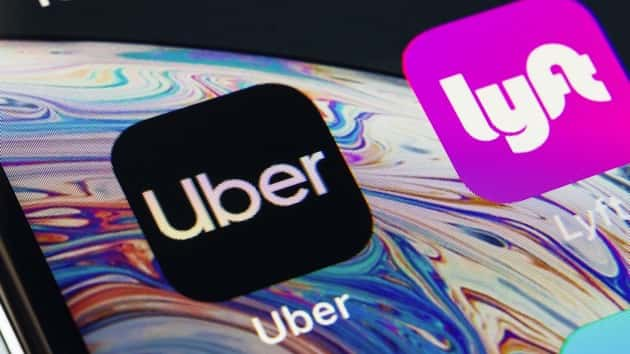
 Anatoliy Sizov/iStock(SACRAMENTO, Calif.) — The California Senate passed a landmark bill that would extend new protections to employees of so-called gig economy companies including Lyft and Uber, essentially forcing companies to recognize formerly contract workers as employees.
Anatoliy Sizov/iStock(SACRAMENTO, Calif.) — The California Senate passed a landmark bill that would extend new protections to employees of so-called gig economy companies including Lyft and Uber, essentially forcing companies to recognize formerly contract workers as employees.
Experts said other states could soon follow.
“Everyone has been watching California with bated breath because whatever happens here is likely to happen in other blue states, and California now has given every other state a road map for how to make changes to the independent contractor status,” Monique Ngo-Bonnici, a labor attorney based in Silicon Valley, told ABC News. “I do think we are going to see a wave of similar legislation all across the country.”
Assembly Bill 5 passed through the State Senate late Tuesday with a 29-11 vote. It still must go through the State Assembly and be signed by Gov. Gavin Newsom, who’s already endorsed the bill in a Sacramento Bee op-ed.
Essentially, the bill requires “a person providing labor or services for remuneration” to “be considered an employee rather than an independent contractor,” according to the text of the bill.
“The law has basically made it impossible for Uber and Lyft, at this time, to continue to run their businesses based on an independent contractor-type platform,” Ngo-Bonnici explained.
Assemblywoman Lorena Gonzalez, one of the bill’s authors, said in a tweet the measure aims to “stop the misclassification of nearly a million misclassified California workers so they are provided a minimum wage, benefits and workplace rights.”
Our #AB5 to stop the misclassification of nearly a million misclassified California workers so they are provided a minimum wage, benefits and workplace rights has passed the Senate today with 29 votes. It now heads to the Assembly.
— Lorena Gonzalez (@LorenaAD80) September 11, 2019
Julian Castro, a 2020 presidential hopeful, voiced his support for the bill on Labor Day.
The work of the labor movement is foundational to who we are as a nation. Labor Day is a time to honor that legacy, and to remember that we still have work to do.
Until every worker has the dignity of a living wage and a union, we must continue the fight.
— Julián Castro (@JulianCastro) September 2, 2019
Opponents of the bill argue it could hurt workers’ flexibility and industries that rely on their labor.
California State Sen. Andreas Borgeas tweeted prior to the vote that the AB5 would “limit an individual’s ability for flexible employment and destroys entire industries across California. Independent contractors and small businesses are the backbone of a thriving California economy.”
The California Labor Federation, a union group based in the Golden State, dubbed the passage of AB5 through the State Senate a “historic win for California workers,” and said in a statement it’s “setting the standard for the rest of the country to follow.”
The passage of California’s bill through the state Senate comes at an uneasy time for the ride-sharing giants. Uber recently fired hundreds of people from its marketing team amid a restructuring, and Lyft reportedly lost a key executive in late July. Just last month, Uber also reported its largest-ever quarterly loss, $5.2 billion.
Adrian Durbin, a Lyft spokesman, told ABC News in a statement that the California leaders “missed an important opportunity to support the overwhelming majority of ride-share drivers who want a thoughtful solution that balances flexibility with an earnings standard and benefits.”
“The fact that there were more than 50 industries carved out of AB5 is very telling. We are fully prepared to take this issue to the voters of California to preserve the freedom and access drivers and riders want and need,” the statement added.
Uber did not immediately respond to ABC News’ request for comment.
How will this affect employees — and consumers?
Ngo-Bonnici, chair of the labor & employment groups for the Los Angeles and Silicon Valley offices of the Winston & Strawn firm, told ABC News that while many drivers will see higher wages and more stability, “There are going to be thousands of people who lose their jobs altogether.”
“Right now they’re independent contractors, but now that this bill has passed, these companies have to convert these independent contractors into employees, but they are not going to convert all of them,” she said. “It’s going to add about 30 percent more cost per individual.”
Those costs will cover benefits for full-time drivers including the ability to apply for unemployment if laid off, being able to earn social security and being able to unionize.
As for how this will impact consumers, Ngo-Bonnici predicts higher wait times for riders.
“Consumers are so used to just clicking a button on your phone and in a few minutes your car is there … all of that is going to go away,” she said. “These companies are not going to have the ability to have just thousands of drivers out on the road just waiting for us.”
“The workers may have to be given their schedules weeks in advance,” she added, “and that takes away all the flexibility that these drivers have, and it also takes away the flexibility for the consumers.”
Copyright © 2019, ABC Radio. All rights reserved.
